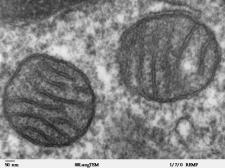"3-Parent Baby" Procedure Faces New Hurdle
By Karen Weintraub,
Scientific American
| 11. 30. 2016
A promising technique to prevent mothers from passing on devastating mitochondrial diseases was thrown a biological curve ball this week: A paper published Wednesday in Nature shows that such diseases can come back to sicken a child, even when 99 percent of the mother’s own mitochondria are eliminated.
Mitochondria are the tiny power plants that provide the energy every cell needs to function. When a large percentage of these organelles malfunction, cells cannot do their jobs—and everything from weakness to death can result. Mothers with certain conditions may have such low levels of faulty mitochondria that they have no symptoms, but their kids can inherit a higher burden of these defective mitochondria, leading to devastating illness.
Continue reading on Scientific American...
Image via Wikimedia Commons.
Related Articles
By David Jensen, California Stem Cell Report | 02.10.2026
Touchy issues involving accusations that California’s $12 billion gene and stem cell research agency is pushing aside “good science” in favor of new priorities and preferences will be aired again in late March at a public meeting in Sacramento.
The...
By Alex Polyakov, The Conversation | 02.09.2026
Prospective parents are being marketed genetic tests that claim to predict which IVF embryo will grow into the tallest, smartest or healthiest child.
But these tests cannot deliver what they promise. The benefits are likely minimal, while the risks to...
By Mike McIntire, The New York Times | 01.24.2026
Genetic researchers were seeking children for an ambitious, federally funded project to track brain development — a study that they told families could yield invaluable discoveries about DNA’s impact on behavior and disease.
They also promised that the children’s sensitive...
By Arthur Lazarus, MedPage Today | 01.23.2026
A growing body of contemporary research and reporting exposes how old ideas can find new life when repurposed within modern systems of medicine, technology, and public policy. Over the last decade, several trends have converged:
- The rise of polygenic scoring...




